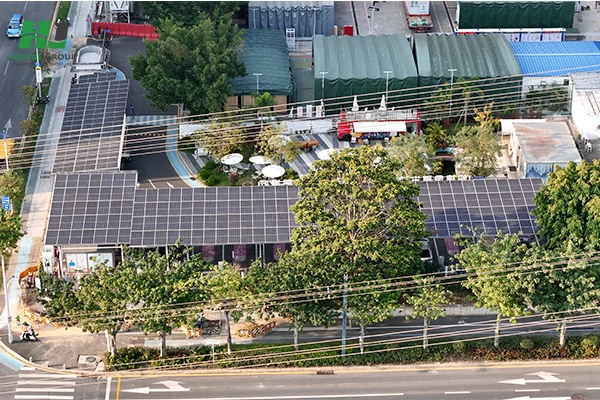PROJECT BACKGROUND
With a growing popularity of electric vehicles, this has called for more convenience and environmentally friendly ways of charging. Currently, the conventional charging stations rely much on grid power, which is not only expensive but also an environmental pollutant. In this respect, there is a need to come up with a sustainable solution that integrates both solar energy and energy storage technologies into electric vehicle charging infrastructure. The proposed project has the objective of developing a fully integrated energy system that combines solar power generation, energy storage, and electric vehicle charging on company premises. It would contribute to increasing efficiency and reliability in energy use within the company's premises. Above all, the use of solar power as a renewable source of energy will make more people want to use an electric vehicle to drive the transition to green energy. In simple words, this project is dedicated to supporting environmental protection and popularizing electric vehicles by coming up with innovative solutions in energy.
Design Plan
Project Overview:
- Location: Parking area within the company's campus
- Type: Solar integrated with energy storage and charging microgrid
- Scope: The scope involves installing a 200 kW solar power system integrated with energy storage and an electric vehicle charging station.
System Architecture:
The proposed architecture of the system shall include:
- Solar panels: These are to be installed in the rooftop of the parking area to capture the solar radiation and convert it to electrical energy.
- Energy Storage System: This is a lithium-ion battery pack used to store excess electrical generation from solar power.
- Charging Station: This is used to charge an electric vehicle.
- EMS System: These are deployed to monitor and manage the operation of the overall solar power generation, storage, and charging station.
- Grid tie inverter: It will convert the DC power generated from the solar panels into AC power for utilization by the charging station and other electrical equipment or feeding the grid.
Design Specification:
- Solar Panel arrangement: Reasonable installation on parking lot canopies so as to result in maximum efficiency of utilization of the solar energy.
- The capacity of batteries in an energy storage system: Battery capacity is chosen based on the demand for electricity in the parks, and how much frequency the charging station has.
- Charging Station Setup: Reasonable setup in number and location based on area size and amount of electric vehicle.
Realize an intelligent management system with effective coordination among power generation, storage, and charging in the EMS system.
PROJECT ADVANTAGES
- Energy-Efficiency and Eco-Friendliness:
- Carbon Emission Reduction with Solar Energy: The proposed development will reduce carbon emissions by using solar energy tapped from panels to be placed atop the parking garage to reduce reliance on fossil fuel-based power.
- Reduction of Heat Island Effect: Solar panels on the roof of the parking garage absorb a lot of heat produced by the cars parked and, in turn, contribute to reducing the urban heat island effect.
- ENERGY STORAGE SYSTEMS HEIGHTEN RENEWABLE ENERGY USAGE EFFICIENCY: It becomes increasingly useful with sources of renewable energy to let storage systems store excess solar energy produced during daytime hours in lithium-ion battery packs for nights and gray days.
- Economic Benefits:
- Self-generation and reduction of the cost of purchased electricity: Electric power generated from a solar system can be consumed on-site at a charging station, reducing demand bought from the grid, therefore reducing the cost of electricity.
- Provide EV charging services as ancillary revenues: charging stations can serve not only the Company's own employees' needs, but also be opened to the public to generate additional economic revenues through charging tariffs.
- This will involve government subsidies that could lower the initial project investment cost, improving the return on investment for both solar and charging station projects.
- Energy Independence:
- Backup Power Energy Storage Systems: These systems are useful in providing backup power during grid failures or at peak power demand, ensuring no disturbance in power supply to the charging stations/parks.
- Improve the company's image: By promoting green energy use, it proves a company's social responsibility and leadership in the sustainable development of the environment; therefore, it enhances its brand image and competitiveness in the marketplace.
- Enhance user experience:
- Convenient charging service: Charging stations will be convenient for employees and visitors; thus, it will improve the service level of the park and attract more EV users.
- Intelligent management can raise the efficiency of operation: Via an Energy Management System-EMS, intelligent scheduling and monitoring ensure the efficient operation and coordination of solar power generation, energy storage and charging stations, thus improving the operating efficiency of the whole system.
